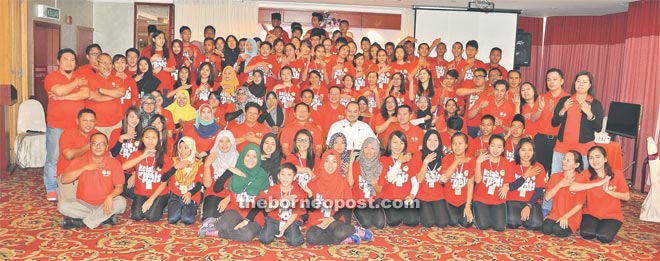
Justine (seated sixth left) and Jonathan (seventh left) in a photo call with the 82 camp participants.
KUCHING: The people here should think of ways to reduce the amount of waste they are generating, which currently stands at about 700,000kg a day.
Deputy controller of the state Natural Resources and Environment Board (NREB) Justine Jok Jau Emang said the figure was derived from a survey they had conducted which found that the city’s population of about 700,000 people generated about one kg of waste per person a day.
“How are we going to contain all the waste generated? Are we going to continue generating a kg of waste per person a day or should we think of ways to reduce it?
“This is the challenge for us living in urban areas in terms of waste management,” he said when representing state NREB controller Peter Sawal to officiate at the closing ceremony of Eco-Camp 2015 which was participated by 82 students from five secondary schools under Serian and Simunjan district education offices at a leading hotel here, yesterday.
Justine said one way the city folk could reduce the waste was to adopt the 3R concept in waste management, namely reduce, reuse and recycle.
He said making compost from the waste generated would not only reduce the amount of waste but the compost could also be used as fertilisers for gardening and organic farming, adding that one could produce premium vegetables using compost fertilisers.
Justine also reminded everyone to bear in mind that non-renewable resources such as oil, natural gas and coal were limited.
On the Eco-Camp, he said it was an NREB flagship programme since 12 years ago with cooperation from multinationals such as Shell Sarawak and Petronas.
“We hope more corporations in future will join us in preserving the environment,” he said, adding that the camp would expose the participants to environmental issues the world was facing.
Meanwhile, Shell Malaysia’s government relations senior manager Jonathan Jolly said with almost 90,000 employees in more than 70 countries, Shell would continue to play its part in improving the environment.
“At Shell, we believe that sustainable development is about operating the business in a manner attuned to community expectations. We have a shared responsibility with the government and society to help facilitate the development of strong and sustainable communities.
“Shell works with the host governments, regulators, conservationists, communities and non-governmental organisations to lessen the impact on biodiversity in areas we operate in.”
He added that the Eco-Camp initiative had been going on for a number of years and it was Shell’s hope to see that the programme would continue running throughout the years and perhaps with collaborations from more government agencies.
“You might also be aware that last year, Shell collaborated with the state government and Petronas in converting Piasau Camp into the Piasau Nature Reserve in Miri.
“By investing in infrastructure and biodiversity enhancement, this unique project repurposes land formerly used for staff housing into a biodiversity haven within city limits… and of course this is the only place in this part of the world where you can find the famous hornbills in town.
“This project is progressing well and we hope that Sarawak Forestry Corporation will be able to open the visitors centre by end of next year. It is a lasting legacy that Miri, and the entire Sarawak, will be proud of for the years to come.”
